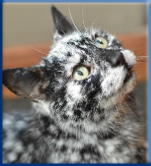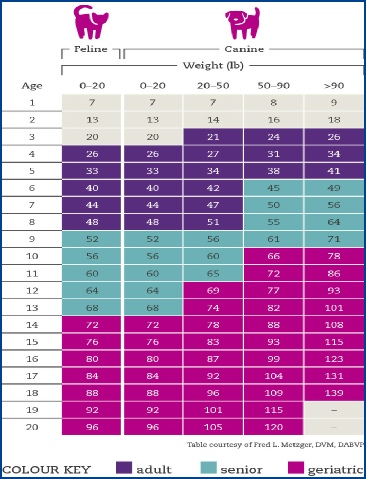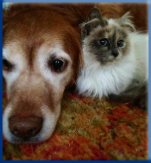


Copyright © 2013-2019 Campbell Village Veterinary Clinic. All rights reserved.


Phone: 972-931-9206
Fax: 972-380-1083











CARING FOR A SENIOR PET
Just as our health often requires extra attention as we age, so does our pets’ health. Thanks to advances in veterinary medicine, our pets are living longer than ever before, and improvements in diagnostic tools and treatment options allow them to be as healthy as possible.
With age, pets may experience an increase in body fat, skin changes, decrease in muscle, bone, and cartilage mass, and/or a decline in brain function or cognition. What may appear to be “normal” signs of aging could actually be early signs of controllable health conditions.Dogs and cats age approximately seven years for every one human year, and large breeds can age even faster.See the table below to see if your pet is considered a senior.

WHAT WE RECOMMEND
As your pet ages, the doctors at Campbell Village Veterinary Clinic recommend a thorough exam to assess your pet’s current health, providing a baseline to compare future findings. More frequent exams thus allow for diagnosing and treating problems earlier to potentially slow the progression of a disease and prevent or minimize discomfort and pain. The doctor may check for physical signs of arthritis, heart and lung disease, dental disease, and eye diseases. He may perform blood and urine tests to identify infections, anemia, certain types of cancer, immune system problems, endocrine disorders (such as diabetes and under- or over-active thyroid), and liver and kidney diseases. He may also recommend radiographs, ultrasound, or EKG testing as necessary.
Changes in your pet’s appearance and behavior are often the first sings of a problem. Have you noticed any of the following signs? Please make note of any changes (such as the ones below) and review them with your doctor.
- Difficulty climbing stairs or jumping up
- Increased stiffness and limping
- Change in behavior/activity level
- Noticeable weight loss or gain
- Increased thirst
- Increased urination
- Loss of house-training
- Change in appetite
- Itching
- Confusion or disorientation
- Less interaction with family
- Decreased responsiveness
- Changes in sleeping patterns
- Change in haircoat or skin
- Tremors or shaking
- Excessive barking




























































